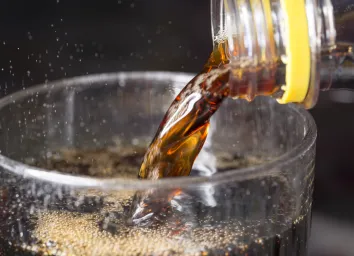What Happens to Your Body When You Drink a Coke
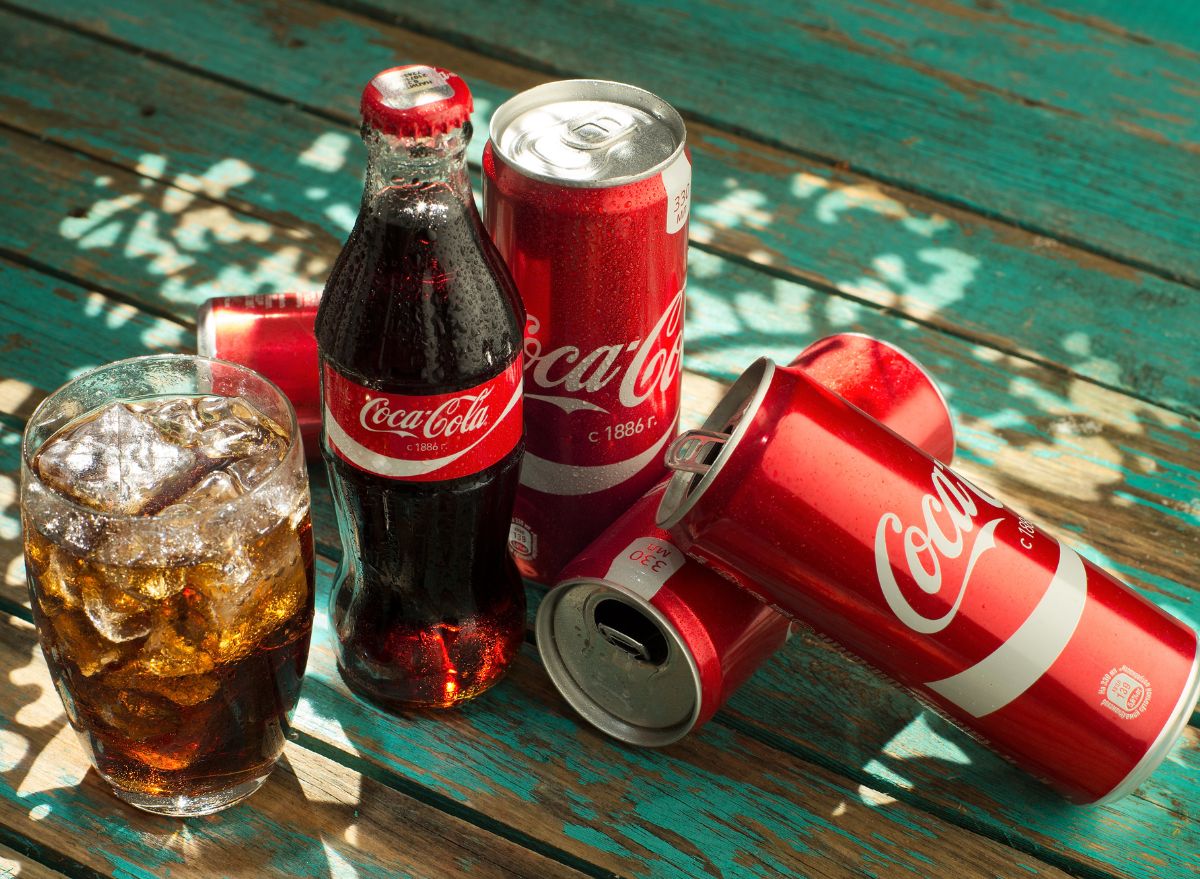
Whether you prefer to call it "cola," "pop," or "soda," Coca-Cola is undeniably one of the most popular cola brands in existence, with millions of people worldwide consuming Coke products every day. While a cold can of the ever-iconic Coke may seem like a refreshing and satisfying beverage choice, have you ever wondered what happens to your body when you drink a Coke and is drinking Coke bad for you?
On the one hand, this soda's over 130-year legacy has enabled its reputation as emblematic of crisp, cold, satisfying sodas—and when you have a hankering for the effervescent taste of Coca-Cola, resistance is sometimes futile. On the other hand, Cokes are notoriously high in sugar while also devoid of other critical nutrients that help your body thrive, making it a less-than-wholesome drink of choice.
To help us get to the bottom of this quandary and explore the possible effects of Coca-Cola on your body, we took a deep dive into the research while also consulting healthcare experts. Read on to find out how drinking Cokes on the regular can potentially impact your short- and long-term health—and for more insight into the health impact of another common bubbly brew, be sure to check out Is Carbonated Water Bad for You? 8 Side Effects of Drinking It.
You might experience blood sugar highs & lows.
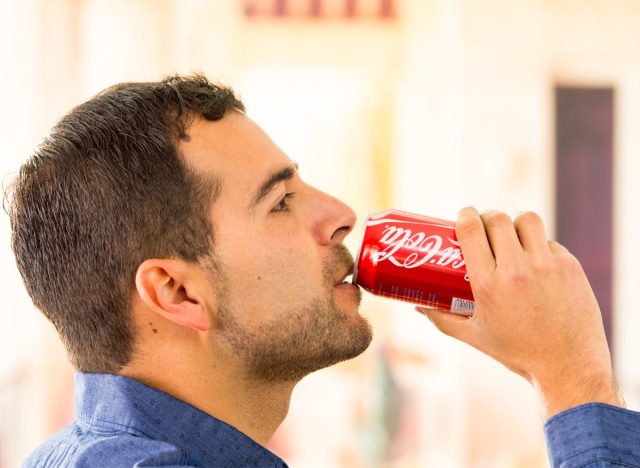
A standard 12-ounce can of regular-flavored Coca-Cola has nearly 39 grams of sugar, which is also about 77% of your recommended daily limit. That said, a few sips can stimulate an intense sugar rush followed by a crash. One British pharmacist Niraj Naik even went as far as to compare the effects that drinking a sugary Coke can have on the body to heroin usage, according to a report from Medical News Today.
"Within 40 minutes, the body has absorbed all of the caffeine from the cola. This caffeine causes the pupils to dilate and the blood pressure to increase. By this point, the Coca-Cola has blocked the adenosine receptors in the brain, preventing drowsiness," the Medical News Today report reads, describing Naik's research. "Just 5 minutes later, the production of dopamine has increased. Dopamine is a neurotransmitter that helps control the pleasure and reward centers of the brain. According to the infographic, the way that Coca-Cola stimulates these centers is comparable to the effects of heroin. It triggers a person's urge to drink another can. An hour after drinking the beverage, a sugar crash will begin, causing irritability and drowsiness. The body will have cleared the water from the cola, along with vital nutrients, in the urine."
Though the comparison between Coca-Cola consumption and heroin usage and withdrawal is arguably a bit extreme, what can't be denied is that Coca-Cola's high sugar content relative to its lack of nutrients can trigger sugar highs (or even sudden spikes) and lows to some degree.
"Since soda is free from healthy fats, protein, and fiber, it doesn't have a lot of 'staying power,'" explains Lauren Manaker, MS, RDN, registered dietitian and author of The First Time Mom's Pregnancy Cookbook and Fueling Male Fertility. "This factor can lead to the sugar consumed in the soda to immediately cause a blood sugar peak followed by a dip."
At the same time, Manaker also notes that Coke's sugar content may prove beneficial in some situations, particularly when someone's blood sugar becomes too low, and they need to recharge ASAP.
"Coke can be a viable choice for people who are experiencing low blood sugar and need a quick boost to get their levels back into the normal range," says Manaker.
You may ramp up your risk of type 2 diabetes.

According to findings featured in a 2010 Circulation study, a correlation exists between drinking sugar-sweetened beverages and developing obesity and/or type 2 diabetes. That said, drinking a Coke could potentially increase your risk of developing these conditions, especially if you're drinking Coca-Cola regularly in excess.
"While drinking an occasional drink is unlikely to be linked to diabetes risk, consuming multiple servings every day may not be the best choice for those who are trying to reduce their risk," says Manaker. "Observational data suggest that frequent sugary soda consumption is linked to type 2 diabetes risk. However, it is still unclear if it is the actual soda that is contributing to this risk or if it is the overall diet and lifestyle people practice among those who tend to drink a lot of soda."
You may experience tooth discoloration & decay.
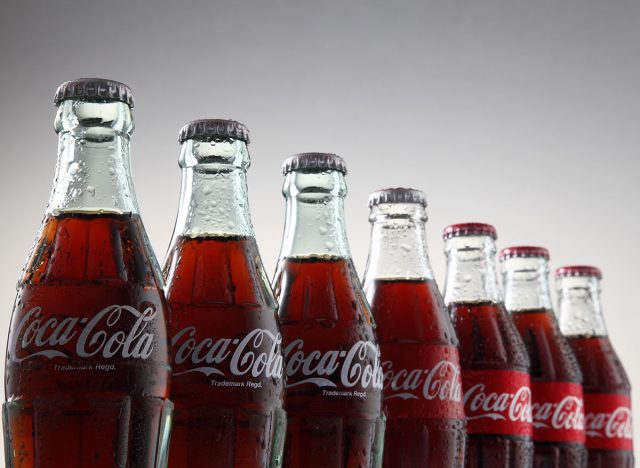
Coke's rich mahogany color is almost as evocative as the brand name itself, often inciting thirst-quenching nostalgia for many. But this brown shade may also potentially lead to yellowish-brown, rotting teeth in the long run.
According to the International Journal of Dentistry, the darker the soda, the more likely it will stain the surface of your teeth. Not to mention, its high sugar content can result in dental erosion and tooth decay.
"Coke has a very acidic pH, which will lead to decalcification of the tooth enamel when consumed in excess," explains Jack Hirschfeld, DDS, a clinical instructor at the Lake Erie College of Osteopathic Medicine's School of Dental Medicine. "In addition, it is very sugary, and the bacteria in your mouth will act on the sugars that will also contribute to the acidity, leading to demineralization."
You may potentially shorten your lifespan.
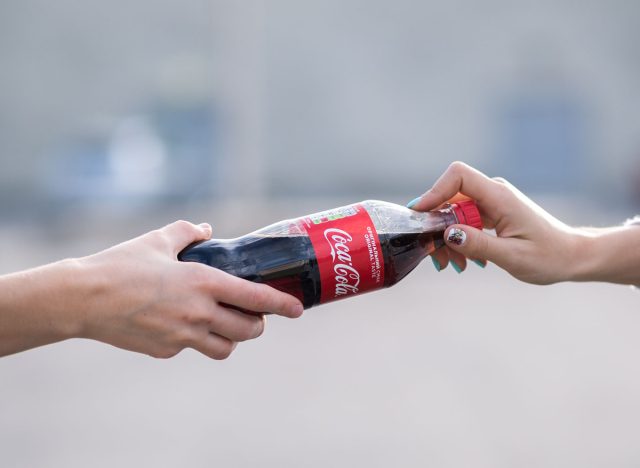
Drinking the occasional Coca-Cola is one thing, but some studies suggest that regularly drinking Coke may actually curb your potential lifespan. One study published in the journal JAMA Internal Medicine following 450,000 Europeans over the course of 16 years revealed that those who frequently drank sugar-sweetened and artificially sweetened soft drinks like Coca-Cola (or even Diet Coke, which is sweetened with aspartame or Splenda) were 26% more likely to die prematurely.
According to a New York Times editorialization of the study, drinking large quantities of soda was also "associated with elevated risks of death from all causes." Furthermore, the results of a study published in Circulation suggest that the inflammatory-inciting properties of sodas can potentially increase your risk of cardiovascular complications, increasing your risk of having a heart attack by 20%—and that's if you're only drinking one tiny 12-ounce can per day!
You may gain weight gain & increase your risk of obesity.

"Coke is made with added sugars, and it doesn't provide any fiber, protein, or health fats—three nutrients that promote satiety, " says Manaker. "Consuming too many added sugars can contribute to weight gain. "
At 145 calories per can, original-flavored Coke is also sweetened with high-fructose corn syrup, a common ingredient used to sweeten beverages which one study in The American Journal of Clinical Nutrition linked to obesity.
You may help hydrate your body.

Manaker notes that "Coke offers very little nutrition—but it is a liquid, and therefore can help support a person's hydration status." Though Cokes can provide hydration to an extent, Manaker is also quick to point out that "there are many other beverage choices that are far better choices for people who want to stay hydrated."
So, is Coca-Cola bad for you? The verdict.

"For generally healthy people, Coke should be considered a 'treat' and should be reserved for enjoying once in a while—if at all," advises Manaker. "The amount people can consume depends on how many other sources of added sugar the person is consuming, as we should be aiming to consume lower quantities of this ingredient.
"I wouldn't recommend that people go out of their way to consume regular Coke," continues Manaker. "But if a person absolutely loves this drink, enjoying it in moderation as a part of an overall healthy diet is likely ok for most people."
"Thankfully, there are better-for-you options out there for Coke lovers that have far less added sugar, and they are made with no artificial colors or flavors," says Manaker. "Options like OLIPOP Vintage Cola offer a flavor that is eerily similar to classic sodas but with a fraction of the added sugars, zero artificial ingredients, and 9 grams of fiber to support gut health."
- Source: https://fdc.nal.usda.gov/fdc-app.html#/food-details/768964/nutrients
- Source: https://www.medicalnewstoday.com/articles/297600#effects-on-the-body
- Source: https://www.medicalnewstoday.com/articles/297600#effects-on-the-body
- Source: https://www.ncbi.nlm.nih.gov/pmc/articles/PMC2708080/
- Source: https://www.ncbi.nlm.nih.gov/pmc/articles/PMC5998368/
- Source: https://www.ada.org/en/resources/research/science-and-research-institute/oral-health-topics/dental-erosion
- Source: https://jamanetwork.com/journals/jamainternalmedicine/article-abstract/2749350?guestAccessKey=b99410a9-8afc-4953-b328-bbb2620dfacd&utm_source=For_The_Media&utm_medium=referral&utm_campaign=ftm_links&utm_content=tfl&utm_term=090319&appId=scweb
- Source: https://www.nytimes.com/2019/09/06/health/diet-soda-health-death.html


